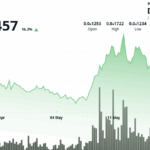
Robinhood urges SEC to create a cohesive regulatory structure for tokenized real-world assets.
Robinhood has put forth a comprehensive proposal to the US Securities and Exchange Commission (SEC), advocating for the establishment of a federal framework to oversee tokenized real-world assets (RWAs), which are estimated to represent a $30 trillion market.
The 42-page document describes a regulatory structure that would enable digital tokens embodying traditional financial instruments, such as stocks, bonds, and real estate, to be recognized as equivalent to their underlying assets.
This initiative seeks to modernize the process of asset issuance, trading, and settlement in the US by incorporating blockchain technology into the current securities regulatory framework.
Integrated regulatory approach
The proposal highlights the fragmented nature of existing RWA tokenization efforts, which have largely functioned in isolated trials and regulatory environments despite significant growth in the sector.
In contrast, Robinhood advocates for a cohesive national framework that would allow broker-dealers to issue and trade tokenized securities in alignment with a standardized compliance model, thereby eliminating the need for disparate systems.
Additionally, the initiative plans to introduce a platform called the Real World Asset Exchange (RRE), which would facilitate off-chain trade matching alongside on-chain settlement processes.
This platform would include compliance measures like know-your-customer (KYC) and anti-money-laundering (AML) procedures from third-party providers to ensure alignment with global regulatory requirements.
If implemented, this framework could clarify legal ambiguities around asset ownership and shorten settlement times while maintaining investor protections under current securities regulations.
Enhancing retail market access
Renowned for its influence in retail stock and cryptocurrency trading, Robinhood is positioning itself as a key player in shaping regulatory infrastructure to transition traditional finance onto blockchain networks.
The proposal asserts that tokenized assets should be recognized as direct representations of conventional financial products rather than classified as derivatives or synthetic instruments.
The company is not advocating for the creation of new blockchain technologies but rather for the legal alignment of tokenized finance with existing compliance norms.
Robinhood’s strategy aims to facilitate greater institutional engagement, providing a scalable framework for blockchain-based financial markets within the US regulatory landscape.
While the SEC has yet to respond to the proposal, Robinhood’s filing may become a pivotal case for how regulators perceive the equivalence of asset tokens. The success of this initiative will likely hinge on regulatory acceptance and the ability to attract institutional involvement while demonstrating substantial utility.
Currently, Robinhood’s submission stands as one of the most organized efforts by a US-regulated broker to formalize the integration of tokenized RWAs into mainstream financial practices.



















Post Comment